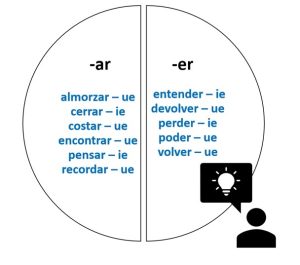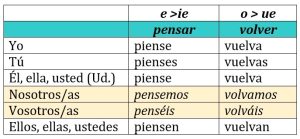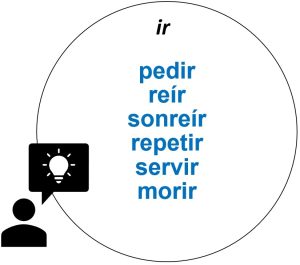Formation of Verbs in the Subjunctive Mood II – Page 3
OBJETIVOS
Recognize and conjugate correctly in the subjunctive groups of verbs with special ortographic changes
Note: As a general rule, you will find that verbs that are irregular in the present indicative, are also irregular in the present subjunctive.
Stem-Changing Verbs ending in -ar and -er
Verbs ending in –ar and –er that change stems in the present indicative follow the same stem-changes in the subjunctive. Thus, as in the present indicative, these verbs do not have stem changes in the nosotros and vosotros form. To review the segment on stem-changing verbs studied in Spanish 101, click here.
The following is a list of common stem-changing verbs ending in -ar and -er.

Let’s take a look at the conjugation of two of these common verbs.

Stem-changing verbs ending in -ir
Verbs ending in –ir with stem changes in the present indicative like pedir, sentir, repetir, preferir, reír, sonreír, dormir, morir and others will undergo stem-changes in all forms, including nosotros and vosotros forms. The unstressed e changes to i, and the unstressed o changes to u.


Verbs ending in CAR, GAR and ZAR
Another common group of verbs is that of verbs ending in CAR, GAR and ZAR, which experience spelling (or orthographic) changes in all subjunctive forms to retain the pronunciation of the consonant sound throughout the conjugation. So the spelling change will be applied to all forms of the present subjunctive, and you will notice that the spelling change is in the letter that precedes the subjunctive endings. Let’s see the following three examples.

Verbs ending in CAR, GAR and ZAR with stem changes
In the cases of verbs that end in ZAR like: comenzar, empezar (with i > ie stem changes) and almorzar (with o > ue stem changes), the stem changes are apply first, followed by the consonant changes.

Note that the three examples above are -ar ending verbs, therefore, as you studied before, the nosotros and vosotros forms do not undergo any changes.
Verbs with irregular yo forms
Similarly, verbs that have irregular yo forms in the present indicative, also have irregular forms in the present subjunctive. However, the irregularities will also be present in all forms. Note that the irregularities in the yo form can also be seen in the rest of the forms.

Examples:

Other irregular verbs:
Verbs that do not end in -o in the yo form of the present indicative, are likely irregular in the present subjunctive. This is the case of the following verbs, which will need to be memorized.


Actividad 1. Completa el cuadro con la forma correcta del verbo en el presente de subjuntivo.


